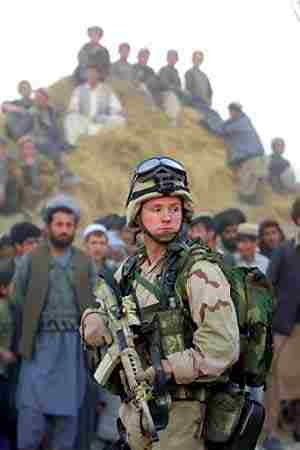Afghanistan: Holbrooke Death Overtakes Analysis of "No Decisive Victory"
 The headline news in Washington is the death of Richard Holbrooke, the senior US diplomat involved in attempted resolution of conflicts from Bosnia to Afghanistan. The coverage is exemplified by this final sentence from a long profile in The Washington Post:
The headline news in Washington is the death of Richard Holbrooke, the senior US diplomat involved in attempted resolution of conflicts from Bosnia to Afghanistan. The coverage is exemplified by this final sentence from a long profile in The Washington Post:
As Mr. Holbrooke was sedated for surgery, family members said, his final words were to his Pakistani surgeon: "You've got to stop this war in Afghanistan."
The tributes are likely to swamp any coverage of the current situation. On Sunday, Rajiv Chandrasekaran --- who wrote the Post eulogy for Holbrooke --- had published a long article on the tensions between US officials and Afghan President Hamid Karzai.
And last night Deb Reichmann of the Associated Press wrote an incisive and significant-analysis which is likely to disappear today:
One year after President Barack Obama ordered a troop buildup to halt the Taliban's momentum, the war in Afghanistan has not broken decisively in favor of U.S.-led forces — at least not yet.
While NATO forces have routed insurgents from their strongholds in southern Afghanistan, the Taliban's strongest region, the militants have opened new fronts in the north and west and have stepped up attacks in the east.
At the same time, the surge has exacted a high price: More than 680 international troops, including at least 472 Americans, have been killed in 2010, making it the deadliest year of the war. Hundreds of Afghan civilians have also died, most as a result of Taliban attacks.
There has been little progress in dislodging the militants from their sanctuaries across the border in Pakistan. A corrupt and ineffectual Afghan government remains a fragile pillar of the U.S. war strategy. And many Afghans expect the Taliban to return to their southern strongholds when the winter snows melt.
"Will they come back? This will be answered in the spring," said Sadeek Dhottani, a 41-year-old farmer in Marjah. "What I think is yes they probably will because when spring appears, the Taliban always show up with greater force and enthusiasm."
The White House's year-end report on the war, to be released this week, is expected to express confidence that Afghan forces can take the lead in securing the country by the end of 2014, but also raise troubling questions about Pakistan's efforts to root out militants.
Gen. David Petraeus, the commander of U.S. and NATO forces in Afghanistan, has called for patience, saying that the extra 30,000 U.S. troops, along with about 10,000 additional NATO forces, just finished arriving at the end of August — roughly nine months after Obama ordered the buildup on Dec. 1, 2009.
Patience as the war plods on, however, is something Afghans are running short of. Tired of the fighting, they wonder why their daily lives have not markedly improved despite billions of dollars in foreign assistance and thousands of foreign troops on their soil for more than nine years.
"I am not able to calmly come to my shop from my house," Sayed Rahmat, a 27-year-old shopkeeper in Ghazni province in eastern Afghanistan, which has not seen the tentative security gains that Afghan and NATO troops have achieved in the south.
"If we don't have security, then we don't have work opportunities," Rahmat told The Associated Press. "Every day that passes, the security situation is getting worse. The government is not in a position to bring peace. Every day, the Taliban are getting more powerful than the government."
In northern Afghanistan, security has been deteriorating for the past two years in Kunduz and surrounding provinces, hideouts for the Taliban, al-Qaida and fighters from other militant factions, including the Haqqani network.
Using Badghis province as a hub, the Taliban also have spread their influence in western Afghanistan and now control several districts.
Petraeus says that in the past few months the coalition has arrested the Taliban's momentum in some parts of eastern Afghanistan and in the southern provinces of Helmand and Kandahar, the focus of the U.S.-led campaign. According to the coalition, 2,469 insurgents were captured and 952 were killed during the 90-day period ending Dec. 2.
The coalition also has ramped up the air war in Afghanistan since this summer. In the first 11 months of the year, coalition aircraft have used 5,465 bombs and Hellfire missiles, exceeding the 4,184 dropped in all of last year.
Whether the counterinsurgency strategy — clearing militants from a territory, holding it, developing it and then transferring it to the Afghans — will ultimately be deemed successful depends a lot on perception. Local government officials can tout a development project, but a few high-profile bombings can fuel the insurgents' fear and intimidation campaign. It's hard for Afghans to back foreigners if they think they're going to be killed as a result.
According to a quarterly report by the coalition, number of Afghans who rate their security situation as "bad" is the highest since the nationwide survey began in September 2008. This downward trend is likely a result of the steady rise in violence since the beginning of the year, the report said.
"The situation on the ground is much worse than a year ago because the Taliban insurgency has made progress across the country," more than 30 academics, aid workers and others working in Afghanistan wrote in an open letter to Obama last week.
"It is now very difficult to work outside the cities or even move around Afghanistan by road. The insurgents have built momentum, exploiting the shortcomings of the Afghan government and the mistakes of the coalition."

 Tuesday, December 14, 2010 at 8:34
Tuesday, December 14, 2010 at 8:34
Reader Comments